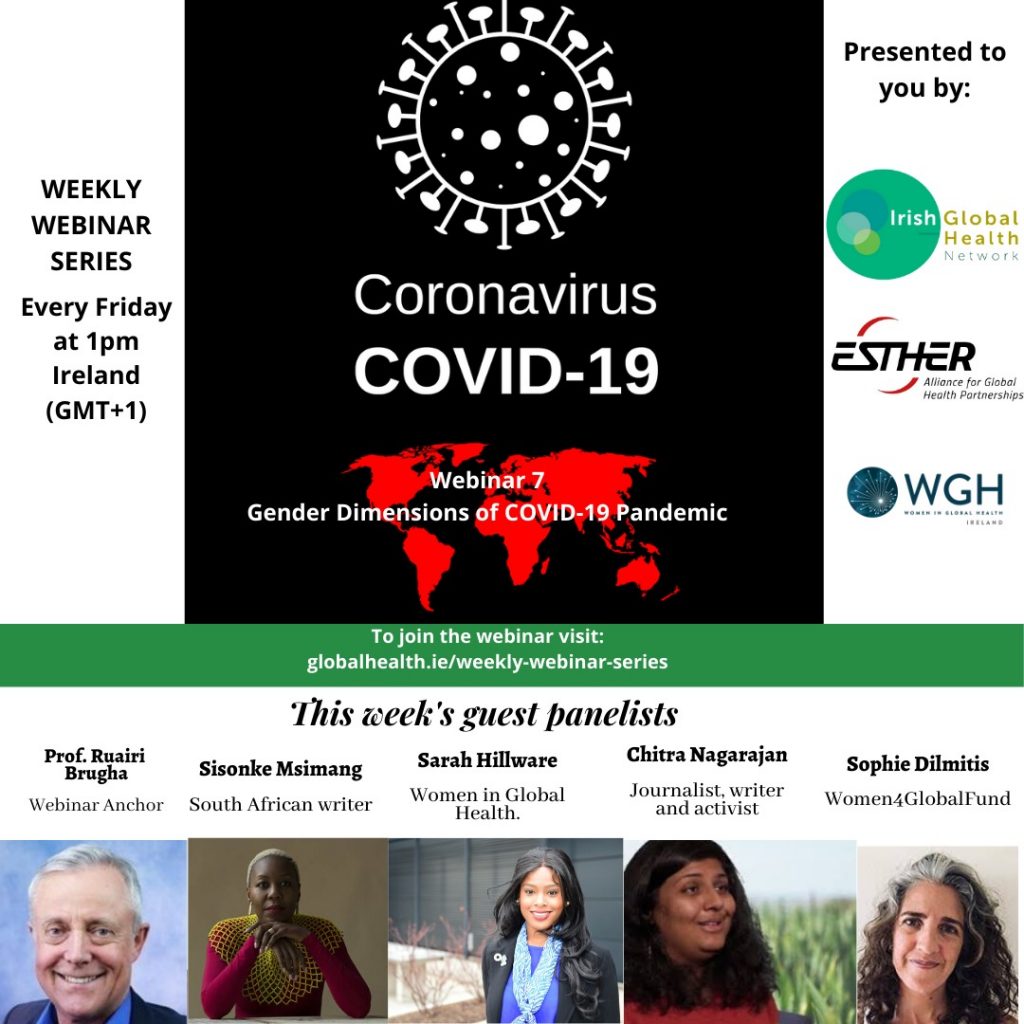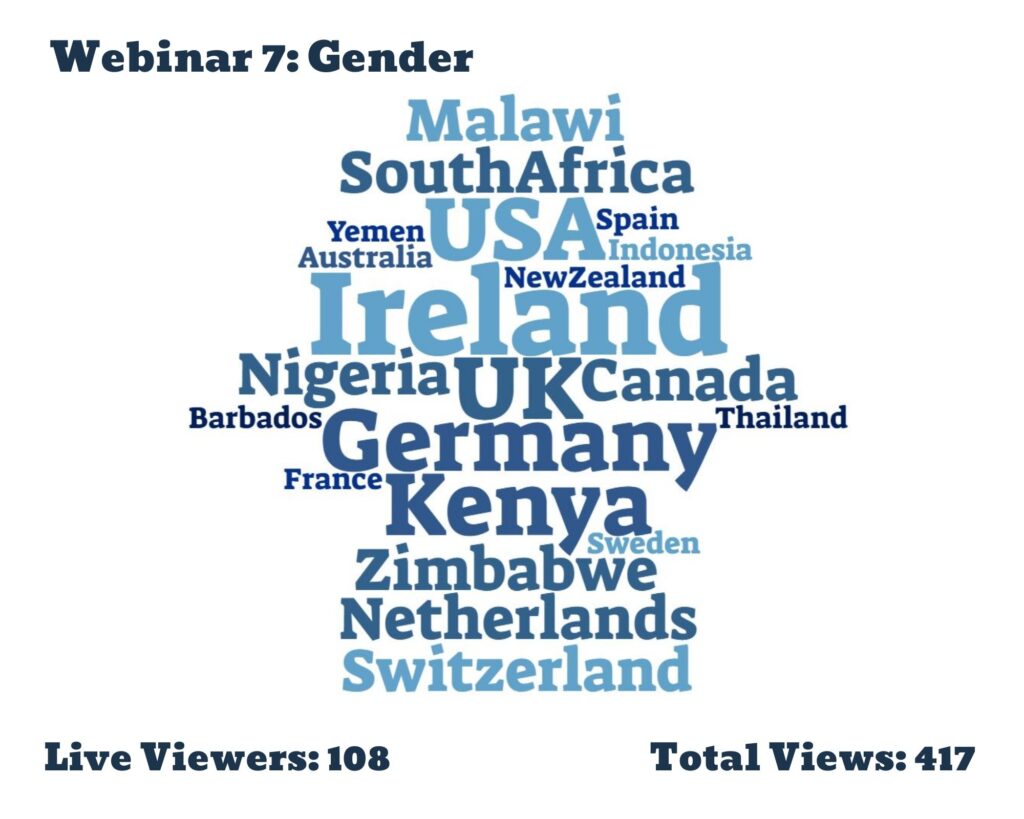Conversations on COVID-19 7th Webinar: Gender Dimensions of COVID-19 Pandemic

WEBINAR SERIES: WEEK SEVEN
Gender Dimensions of COVID-19 Pandemic
The seventh webinar was held on Friday 01/05/2020 at 12:00 pm GMT/1PM Irish Time.
VIEW THE WEBINARCOMPLETE WEBINAR EVALUATION
Irish Global Health Network, ESTHER Alliance, Women in Global Health Ireland and Women for the Global Fund to Fight AIDS, TB and Malaria have collaborated to publish a gender summary brief to mark a new country chapter of the Women in Global Health Movement in Ireland.
Download BriefThe brief is centred on the topics highlighted during the Conversations on COVID-19 7th Webinar: Gender Dimensions of COVID-19 Pandemic which was co-hosted with Women in Global Health Ireland as part of its inaugural launch event.
A SUMMARY OF POINTS MADE IN WEBINAR BY SPEAKER AND THEIR INDIVIDUAL RECORDINGS ARE AVAILABLE BELOW
Chitra Nagarajan. A journalist, writer and activist involved in feminist, anti-racist, anti-fundamentalist and queer movements, Nigeria
- The pandemic overlays pre-existing inequalities and has exacerbated issues of access to healthcare. In healthcare, women have difficulty accessing services because of gender norms. Distribution of family planning supplies has not happened due to movement restrictions. Implications on unsafe abortions are also unknown, but we know that rapes and abortions increase in times of crisis. Violence against women and girls had doubled with respect to phonecalls received within 36 hours in Lagos state.
- GBV services have not been classed as essential services by government, so there isn’t freedom for responders to move and meet the needs of women. Overarchingly the government needs to take gender seriously. We need more women involved on the presidential taskforce and state committees on Covid. A clear strategy on response and prevention of violence against women and girls is needed along with a gendered economic analysis of economic impacts so that policies are reflected in government mitigation measures – including in the recognition of women’s unpaid care work.
Sisonke Msimang is a South African writer whose work is focused on race, gender ad democracy. COVID-19 is a feminist issue with women being the hardest hit, even if there is evidence that they are not biologically the hardest hit. View her contribution here
- Covid is a feminist issue, it’s a question of power, and in times of crisis, women are the hardest hit. Even if this is not the case biologically, it is true in terms of social impact. There hasn’t been enough reporting on the gender dynamic of the pandemic. There is a gap between true cases and detected cases. Looking at death registries, the with last years death rate is showing us the difference and the scale of the pandemic.
- Increased numbers of calls are being received to services from women suffering violence. Lockdown is exacerbating coercive control for women. The question for all of us is to consider how we are all going through the same experience of being human around the world. Some of us are pushing ahead for rapid globalisation and others are taking pause and asking if we can use this as an opportunity to give people a just income, where the state has a role to play in offering support. Social and environmental justice norms are being questioned and this pandemic is offering us a great opportunity to address those norms.
Sophie Dilmitis, Women4GlobalFund (W4GF), Coordinator
- Covid has brought into focus the inequities and vulnerabilities for women. Now we are seeing communities affected by HIV and TB and Malaria being much worse affected. With regard to access to treatment and testing, instruments used to test for TB are being taken for Covid and leaving gaps, which is problematic given TB is such a challenge. Issues around connectivity are paramount too. The digital divide is leaving community advocates behind. We have to advocate for meaningful participation for women working from home.
- National legal frameworks don’t highlight recourse for women who may be abused by men, or even police. Covid travel restrictions are have devastating impact on accessing reproductive health services and abortions. It has been estimated by Mary Stokes international that 80 percent reduction in service delivery for three months and minimal services for the rest of the year will affect 9.5 million people who will miss out on contraceptives. If normal delivery resumes after three months, then the figure will drop to 4 million people affected. We need countries to have gender security awareness.
- Lessons we can apply: our community activism has been the backbone of AIDS response. No other health movement has moved as quickly as HIV although COVID might take that over. If I compare the response to Covid and HIV, a lot of what people went through, the huge fear, the conspiracy theories, the death, the uncertainty, the misinformation. We’ve been there and we understand how to be at the table and advocate for what we need. We know how to track the money and what meaningful engagement means. We have an opportunity to provide a new health system that provides more equity.
Sarah Hillware, Deputy Director at Women in Global Health.
- To make sure responses are integrated we need to challenge power and privilege in global health. We do this through institutional change. Pandemics like this have shown us that when we have more women in leadership, then the needs of vulnerable communities are better represented. We can’t unlink saving lives from gender, when people are saying that we can deal with the gender implications later. Women make up 70% of the healthforce but only represent a small fraction in leadership roles. We have launched five asks, https://www.womeningh.org/5-asks policy actions for a gender response in the global community.

CATEGORIES
- Restore Humanity Campaign
- Equity in Action Blog
- Training Programmes
- Sponsorship
- Vaccine Equity
- Get Global – Global Health Talks
- Student Outreach Team
- Get Global Young Professionals Talk Global Health
- Global Health Matters – Live Event Series
- Global Health Matters – IGHN Live Event Series
- An initiative of Irish Global Health Network
- ESTHER Ireland and ESTHER Alliance for Global Health Partnerships
- Global Health Matters – Webinar Series
- ESTHER
- IGHN Conferences
- Global Health Conference 2020
- Women in Global Health – Ireland Chapter
- ESTHER Partnerships
- Weekly Webinar Series
- 4th Global Forum on HRH
- Access to Medicines
- Archive Page Weekly COVID Webinars
- Clean Cooking 2019
- Climate Change and Health Conference 2017
- Conference Abstracts
- Conference Materials
- Covid FAQ
- COVID Funding Opportunities
- COVID-19
- COVID-19: Gender Resources
- Dashboard and online resources
- Education
- ESTHER Alliance
- Events
- Events & News
- Funding covid
- Global Health Exchange 2018
- Global Health Exchange 2019
- Global Health symposium 2019
- Health Workforce/HRH
- Homepage Featured
- Homepage recent posts
- IFGH 2011-2012 Conference and Events
- IFGH 2014 Conference
- IFGH Multimedia
- Irish AIDS Day 2017
- Irish News and Feeds
- Key Correspondent Articles
- Key Correspondent News
- Maternal Health
- Multimedia
- News
- News & Events
- Newsletter
- Opportunity
- Our LMIC's Resources for COVID19
- Partner Country News and Feeds
- Past Events
- Policy
- Presentations
- Recurring events
- Reports & Publications
- Research
- Resources
- Student Outreach Group
- Students Corner
- TEDTalks
- TRAINING COURSES FOR HEALTH CARE PROFESSIONALS
- Uncategorized
- Upcoming Events
RECENT POSTS

Impact testimonies- Lombani

Impact Testimony – Shadrick

Power, Inequality, Decolonisation – and Living My Recovery By Bronwyn April

Global Health Without Borders: Reflections on the Power of Diverse Voices

IGHNxEU – Empowering Women for a Healthier Europe

